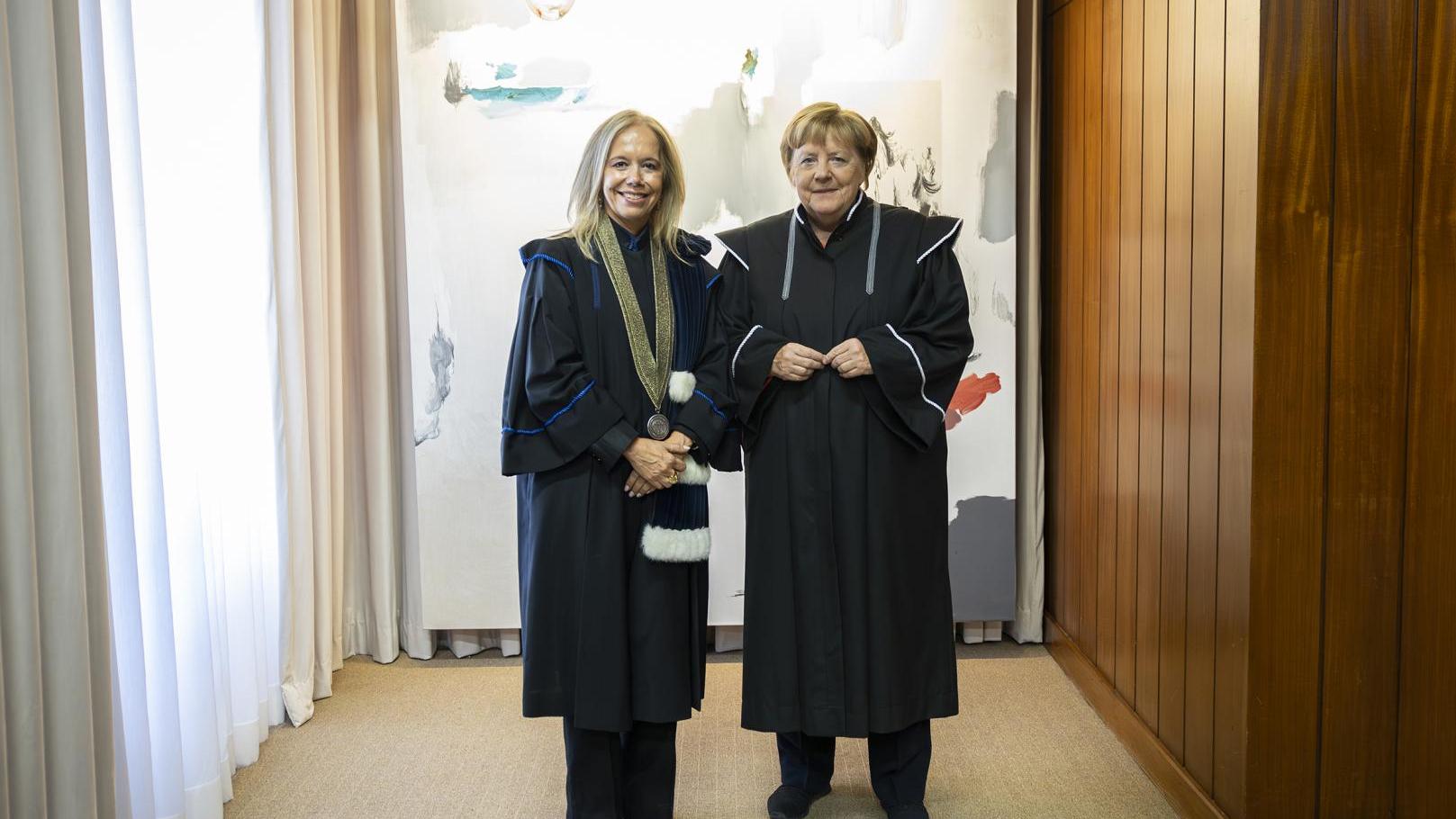
The Universidade Católica Portuguesa awarded the degree of Doctor Honoris Causa to Angela Merkel, Chancellor of the Federal Republic of Germany between 2005 and 2021, at a ceremony in Lisbon attended by various personalities and guests, including the Deputy Minister for State Reform, Gonçalo Matias; the Mayor of Lisbon, Carlos Moedas; the former President of the European Commission, José Manuel Durão Barroso; and former Prime Minister Pedro Passos Coelho, among others.
In her opening speech, and referring to Angela Merkel as an ‘inescapable personality in the history of the 21st century’, the President of the Universidade Católica, Isabel Capeloa Gil, highlighted the role of the emeritus chancellor ‘for 16 years in a life of service to the public cause and the common good’.
"This is therefore the right time to pay tribute to Angela Merkel, to recognise the greatness of her action, the future she has bequeathed us, the particularity of her leadership, which also stems from the specific time of women's experience, and which in a political universe that is still hegemonically male is an inspiration for future generations. We honour a leadership founded on values, free and without fear," explained Isabel Capeloa Gil. She also stressed that the award of this Honoris Causa doctorate also celebrates "the deep academic relations that unite Portugal and Germany, in law, science, the humanities, economic and political relations. A long past and a future that, we know, will be even longer".
The President considered that ‘in an always uncertain time, Angela Merkel was the right woman for the circumstances’, pointing out the importance of her action in the European Union between 2005 and 2021, in managing the sovereign debt crisis and the refugee crisis, but also during the pandemic or in the face of the Russian threat in Ukraine, always defending the values of European humanism and freedom.
The President of the Republic, Marcelo Rebelo de Sousa, the doctoral candidate's godfather and head of Laudatio, also shared his praise for Angela Merkel, saying that the award of this Honoris Causa doctorate is ‘one of the most important gestures of the Universidade Católica Portuguesa".
For Marcelo Rebelo de Sousa, Angela Merkel "always preferred the straight line to the curves in her life, even if they seemed to reach the same end goal, and added to the iron coldness of reason the compassion born of roots and memories that she never forgot. He always favoured philosophical and religious conviction over the most important political, economic, social and cultural values and, more often than not, strategic or tactical convenience."
The President also valued the post-pandemic decisions that enabled the Recovery and Resilience Plans to be drawn up and his ‘irremovable position on migration, against the party, government, countries, Europe and the world, already prey to the tempting, selfish and, in some excesses, pharisaical wave, but popularly very attractive and allegedly pious, a wave that rises and will rise until its sorcerers fall victim to its spells’.
After the imposition of the insignia and the awarding of the honorary doctorate, Angela Merkel thanked the Universidade Católica, saying: ‘It is a very special honour for me to be able to receive this distinction precisely here, at a university with students from 113 nationalities, a university that is committed to values such as the dignity of the human person, democracy, the rule of law and freedom.’
The German chancellor emeritus evoked dark periods in European history, referring to the the authoritarian regime in the former East Germany. She also emphasised the importance of freedom and democracy, saying that German reunification at the time was experienced as ‘a miracle’.
During her speech, Merkel reflected on the current challenges facing Europe, in particular the migration crisis and the rise of populist movements and shared his vision of the role of politics and the responsibility of the new generations. She emphasised that civic participation is essential to preserve democratic achievements and that freedom cannot be taken for granted, but must be defended on a daily basis.
The Chancellor Emeritus added: ‘True freedom is not just freedom from something, but manifests itself in responsibility for something: for our neighbour, for the community, for our common good,’ and reiterated: "Freedom is for everyone. Politics is worthless if citizens don't participate."


